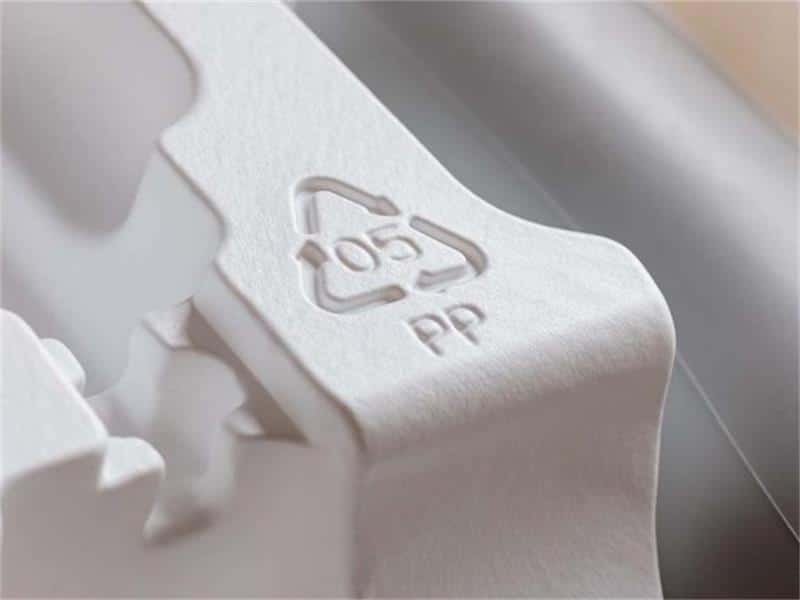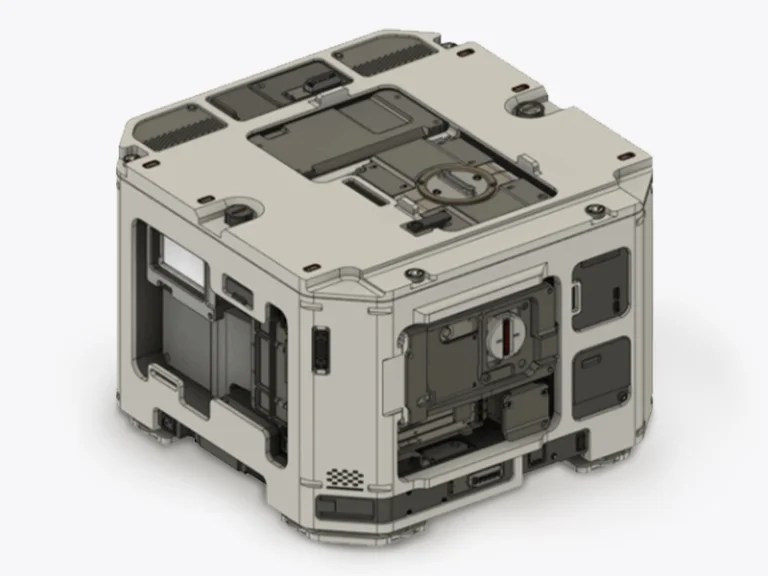Plastic injection molding is the core process of modern manufacturing industry, widely used in automotive, electronics, home, medical and other industries. In many plastic materials, the characteristics of different elements adapt to the needs of various scenarios. To help you choose the right material, this guide will cover 12 common plastic injection molding materials in detail, covering their performance characteristics, application advantages and applications. By comparing the parameters of these elementary substance , you will gain a better understanding of what makes each material unique, allowing you to make more precise decisions during project design and manufacturing.
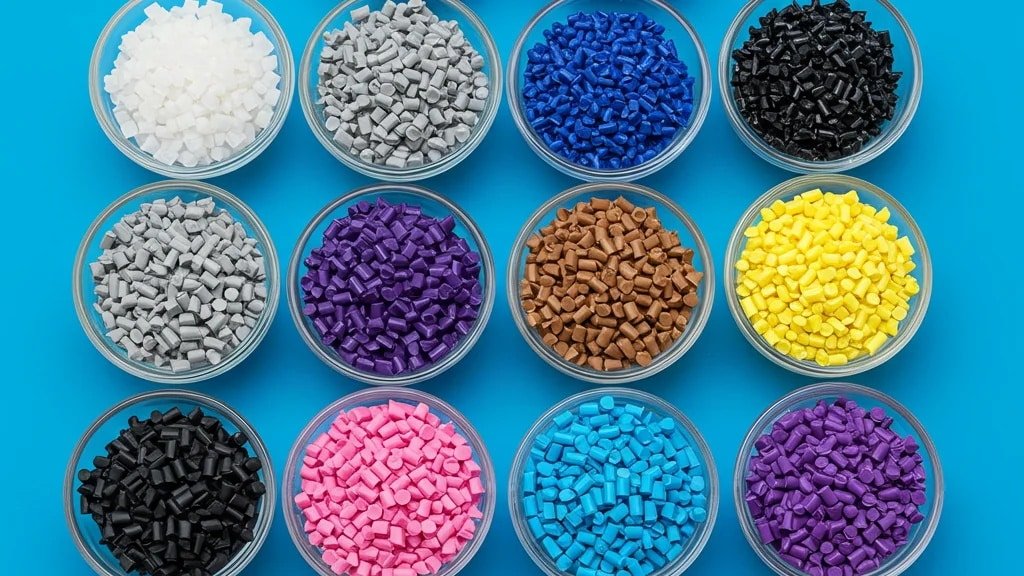
Common Plastic Injection Molding Materials
1. Polyethylene (PE)
Polyethylene is the most popular and commonly used plastic in the world. It is a lightweight, ductile, and chemically resistant material with good impact strength.
- Key Advatange: Flexible, waterproof, chemical resistant
- Used For: Bags, containers, tubing, insulation, film
- Avoid When: High stiffness or heat resistance is needed
2. Polypropylene (PP)
Polypropylene is a lightweight and durable thermoplastic known for its high stiffness, heat resistance, and chemical resistance. PP can be easily recycled, making it an environmentally friendly choice for many applications.
- Key Advatange: Chemical resistant, flexible, lightweight
- Used For: Food containers, household goods, auto parts, medical devices
- Avoid When: High clarity or heat resistance is needed
3. Polystyrene (PS)
Polystyrene is a versatile thermoplastic known for its clarity, rigidity, and excellent processability. PS can be easily processed through injection molding, extrusion, and thermoforming techniques.
- Key Advatange: Rigid, glossy, easy to process
- Used For: Disposable cutlery, toys, appliance parts, display boards
- Avoid When: High impact strength is required
4. Acrylonitrile Butadiene Styrene (ABS)
ABS is a tough and impact-resistant thermoplastic known for its high strength, stiffness, heat resistance, and dimensional stability. It offers good chemical resistance and can be easily machined, painted, and welded.
- Key Advatange: Tough, aesthetic finish, easy to mold
- Application Used For: Appliance housings, automotive interiors, toys, electronics
- Avoid When: High temperature or chemical resistance is required
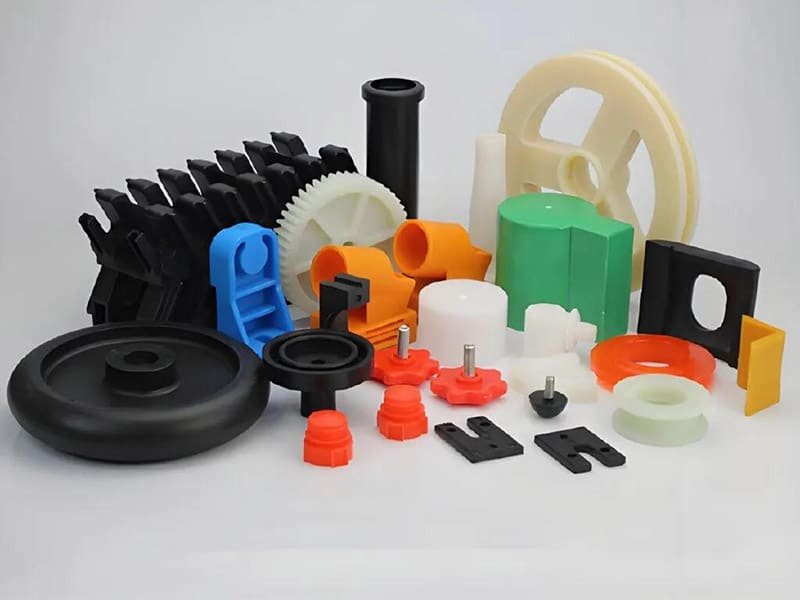
5. Polyvinyl Chloride (PVC)
PVC is a widely use on plastic injection molding materials known for its excellent chemical resistance, weather ability, and flame retardancy. PVC can be rigid or flexible, depending on the additives and processing techniques used.
- Key Advatange: Durable, chemical resistant, cost-effective
- Used For: Pipes, cable insulation, medical tubes, packaging
- Avoid When: High heat or direct food contact is involved
6. Nylon (PA)
Nylon is a family of synthetic polymers used in many commercial applications. The most common types used for injection molding are Nylon 6, Nylon 6/6, Nylon 66, and Nylon 6/66, which offer improved mechanical properties, heat resistance, and chemical resistance.
- Key Advatange: High strength, wear-resistant, chemical-resistant, good toughness
- Used For: Gears, bearings, automotive parts, electrical connectors, industrial components
- Avoid When: Low moisture absorption or dimensional stability in humid conditions is critical
7. Polycarbonate (PC)
Polycarbonate is a strong, durable, and transparent plastic material. It has good heat resistance and can be combined with flame retardants. However, it is susceptible to scratching and requires UV stability. PC can be easily processed through injection molding, extrusion, and thermoforming technique.
- Key Advatange: High impact resistance, transparent, heat resistant
- Application Used For: Electronics cases, lighting lenses, windows, medical parts
- Avoid When: Exposed to strong acids or bases
8. Acrylic (PMMA)
Acrylic is a strong, clear thermoplastic that allows plenty of light to pass through. It is shatter-resistant and resistant to sunlight and weather, making it suitable for applications like windows, greenhouses, and lighting.
- Key Advatange: Crystal-clear, UV resistant, easy to shape
- Used For: Light covers, display panels, lenses, signage
- Avoid When: Impact or heat resistance is critical
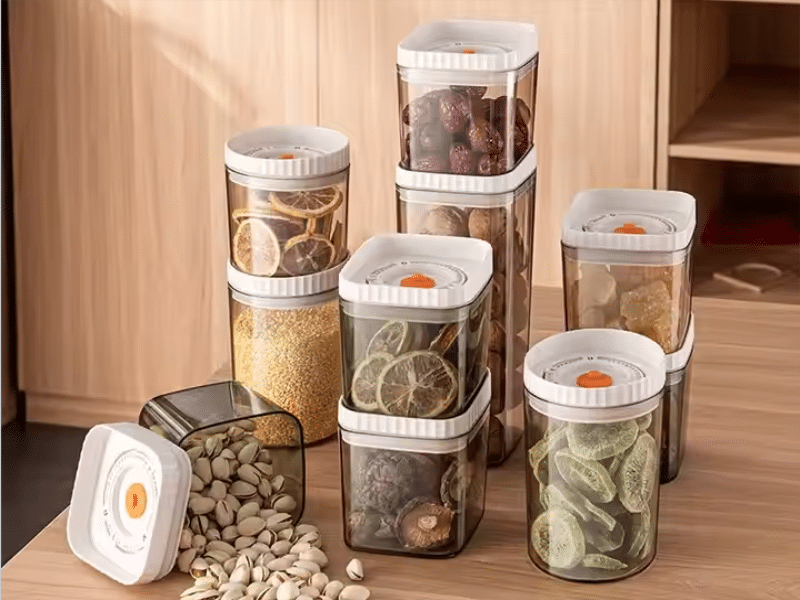
9. Polyethylene Terephthalate (PET)
PET is a strong and lightweight thermoplastic known for its excellent barrier properties, clarity, and recyclability. PET can be easily processed through injection molding, blow molding, and thermoforming techniques.
- Key Advatange: Clear, strong, food-safe
- Used For: Bottles, fibers, electrical housings, medical packaging
- Avoid When: High impact durability is needed
10. Phenol Formaldehyde Resins (PF)
Phenolic resins are synthetic polymers derived from phenol and formaldehyde, known for their excellent heat resistance, electrical insulation properties, and dimensional stability.
- Key Advatange: Heat-resistant, insulating, flame retardant
- Used For: Electrical insulators, brake pads, adhesives
- Avoid When: Transparency or easy processing is needed
11. Epoxy (EP)
Epoxy resins are thermosetting polymers formed through the reaction of epoxide monomers and curing agents. It is one of the most commonly used thermoset materials for injection molding. It is a low-cost resin that can be molded in many ways and is frequently used as both an adhesive and a molding compound.
- Key Advatange: Excellent adhesion, insulating, chemical-resistant
- Used For: Electronic encapsulation, composites, adhesives, coatings
- Avoid When: Flexibility is required
12. Polyurethane (PU)
Polyurethane (PU) resins are versatile thermosetting polymers known for their flexibility, toughness, and abrasion resistance. They exhibit excellent mechanical properties over a wide range of temperatures. PU resins can be formulated to have varying degrees of hardness, elasticity, and chemical resistance, making them suitable for a wide range of applications.
- Key Advatange: Excellent adhesion, insulating, chemical-resistant
- Used For: Electronic encapsulation, composites, adhesives, coatings
- Avoid When: Flexibility is required
For more information on plastic injection molding notes, Please see here!
Summary of Performance Parameters of Plastic Injection Molding Materials
| Materials | Density (g/cm³) | Tensile (MPa) | Bending Strength (MPa) | MOE (MPa) | HDT (°C) | Shrink Rate (%) | Feature |
|---|---|---|---|---|---|---|---|
| ABS | 1.05 - 1.10 | 40 - 70 | 65 - 90 | 2000-3000 | 80 - 110 | 0.4-0.8 | Good impact resistance, stable size, easy processing |
| PC | 1.20 | 60 - 70 | 90 - 100 | 2200 - 2500 | 120-140 | 0.5 - 0.7 | Good transparency, high strength, excellent heat resistance |
| PP | 0.90-0.91 | 25 - 35 | 30 - 50 | 1200 - 1500 | 100 - 120 | 1.0 - 2.5 | Good chemical resistance, light weight, fatigue resistance |
| POM | 1.41 - 1.43 | 60 - 70 | 90 - 100 | 2500 - 3000 | 100 - 120 | 1.5 - 3.5 | High rigidity, good wear resistance, dimensional stability |
| PET | 1.30 - 1.45 | 55 - 75 | 100 - 120 | 2800 - 3100 | 150 - 170 | 0.5 - 1.2 | Good rigidity, high heat resistance, good oxygen resistance |
| PVC | 1.30 - 1.58 | 40 - 55 | 70 - 90 | 2000 - 2500 | 70 - 80 | 0.2 - 0.6 | Excellent chemical resistance, good electrical insulation |
| PMMA | 1.18 - 1.20 | 50 - 75 | 75 - 110 | 2500 - 3000 | 75 - 105 | 0.2 - 0.6 | High transparency, good weather resistance, easy processing |
| PE | 0.91 - 0.96 | 10 - 30 | 20 - 40 | 400 - 800 | 40 - 80 | 1.5 - 4.0 | Good water resistance, good impact resistance, good softness |
| PS | 1.04 - 1.07 | 30 - 50 | 60 - 80 | 1800 - 2200 | 60 - 80 | 0.4 - 0.8 | Transparency, good electrical insulation, good rigidity |
| TPU | 1.05 - 1.25 | 25 - 55 | 30 - 80 | 200 - 1000 | 50 - 100 | 1.2 - 2.5 | Good elasticity, wear resistance, low temperature resistance, flexibility |
| PF | 1.25 - 1.35 | 30 - 50 | 80 - 100 | 3000 - 3500 | 150 - 180 | 0.8 - 1.0 | High heat resistance, excellent insulation, good chemical resistance |
| EP | 1.15 - 1.20 | 50 - 90 | 80 - 120 | 2500 - 3500 | 130 - 180 | 0.2 - 1.0 | Excellent adhesion, chemical and electrical insulation resistance, good heat resistance |
Conclusion
Choosing the right plastic material is critical to the success of your injection molding project. Each resin offers distinct properties—such as flexibility, heat resistance, or chemical durability—that directly impact the product’s performance, appearance, and cost. From high-impact ABS to transparent PC or flexible TPU, the material you select will determine not only how your part functions but also how efficiently it can be molded and how long it lasts in real-world applications.
At Jiangzhi, our engineering team can help you evaluate material options based on your design, budget, and performance goals—ensuring the best-fit solution for your unique application.

